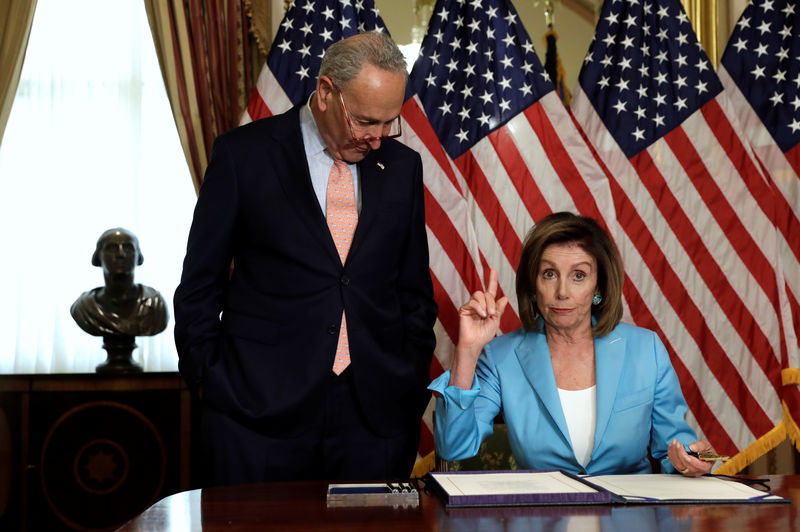By Richard Cowan
WASHINGTON (Reuters) - The U.S. Senate on Thursday passed and sent to President Donald Trump a two-year budget deal that would increase federal spending on defense and an array of other domestic programs, significantly adding to rapidly escalating government debt.
By a vote of 67-28, the Senate ignored late-hour appeals from some conservative Republicans who support bigger military expenditures and tax cuts that constrain revenues but were angered over more spending for non-defense domestic programs.
Last week the Democratic-controlled House of Representatives passed the bill with tepid Republican support, despite Trump's push for Congress to approve it.
The legislation would authorize $2.75 trillion in new defense and non-defense spending through Sept. 30, 2021.
Meanwhile, the statutory limit on Treasury Department borrowing would be suspended until at least July 31, 2021, in an attempt to erase any possibility of a default on debt through the November 2020 U.S. election.
The legislation "ensures our federal government will not approach any kind of debt crisis in the coming weeks or months," Senate Majority Leader Mitch McConnell, a Republican, said in urging passage of the bill.
If signed into law by Trump, as expected, the legislation would add significantly to federal budget deficits that already were projected to climb to $1 trillion annually in the short term.
"This may well be the most fiscally irresponsible thing we've done in the history of the United States," said Republican Senator Rand Paul, who voted against the bill.
The bill also would virtually guarantee that Trump's campaign vow in 2016 to erase government debt within eight years would not only go unfulfilled, but that debt would significantly rise during his current four-year term in office.
Since Trump took office in January 2017, U.S. debt has risen by around $2.5 trillion and is rapidly climbing above the $22.5 trillion mark it is now at - a level some experts see as dangerously high.
Nevertheless, Trump called the budget deal "phenomenal" in a Twitter post and, in urging support from conservative senators, added, "Go for it Republicans, there is always plenty of time to CUT" spending.
Under the bill, defense spending would rise from an already robust $716 billion this year to $738 billion in fiscal 2020, which begins on Oct. 1, and to $740.5 billion the following fiscal year.
Meanwhile, non-defense programs - ranging from border patrol and veterans' healthcare to cancer research, space exploration and transportation improvements - would rise from the current $605 billion this year to $632 billion next year and $634.5 billion the following year.
These "discretionary" programs do not include trillions of dollars spent each year on "mandatory" programs, including Social Security retirement benefits and Medicare and Medicaid healthcare for the poor and elderly.
In September, Congress will still have to work out how the money will be distributed to specific programs. Failure to do so by Sept. 30 could lead to new partial government shutdowns.

Late last year and early this year, Trump's demand for billions of dollars to build a wall on the U.S.-Mexico border to repel immigrants -- opposed by Democrats and some Republicans -- led to a standoff that left many federal agencies without funds to fully operate.